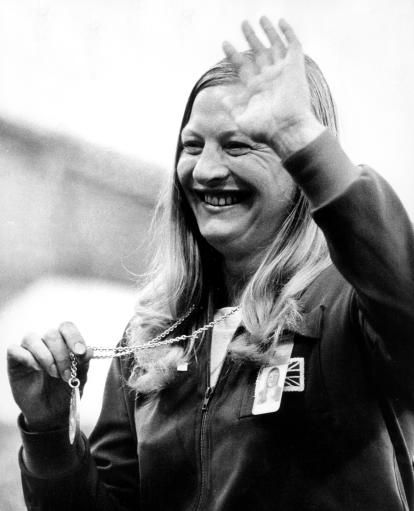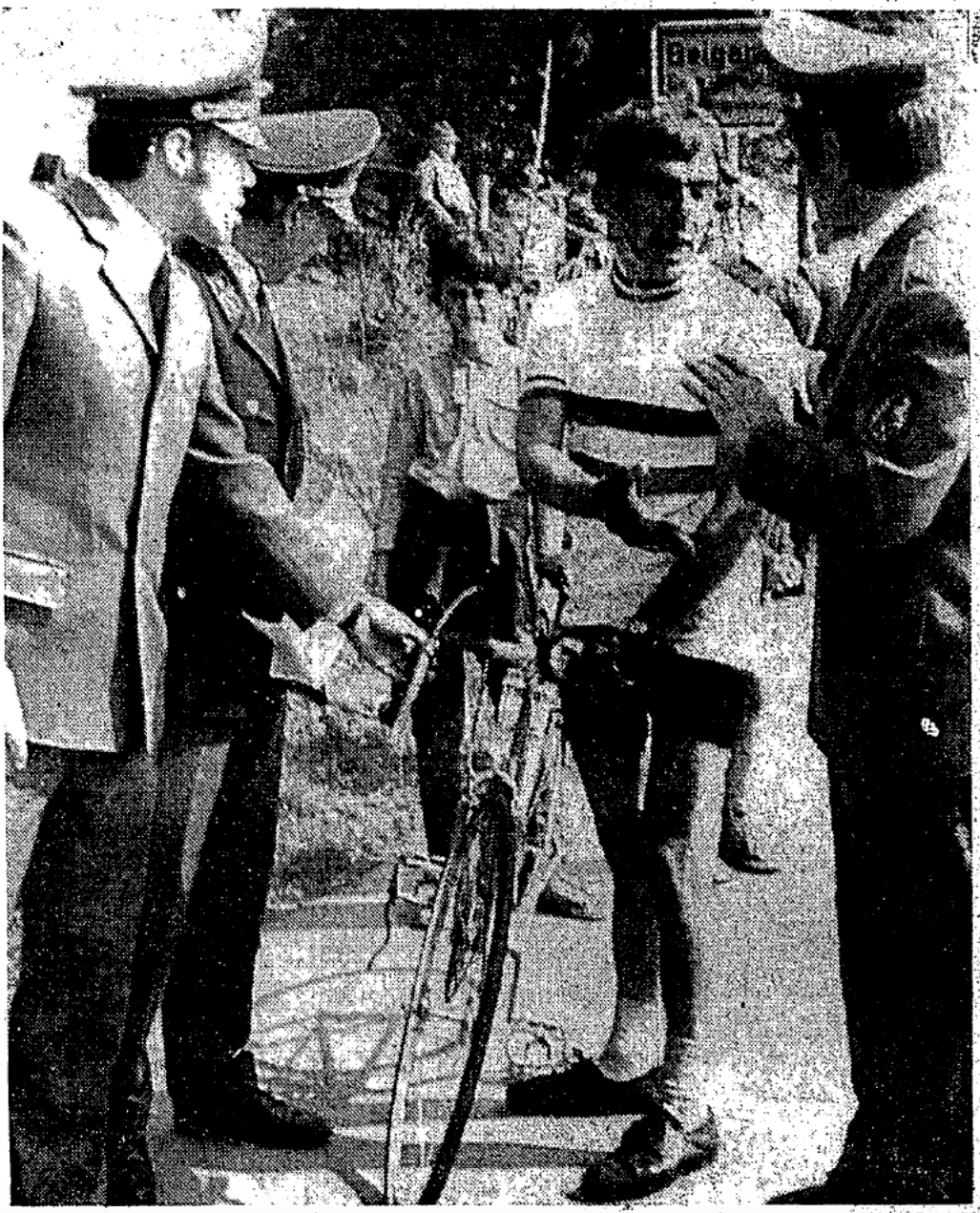

Share
24th July 2020
09:21am BST

 Three of the slain Israeli Olympic team (from left) Zeev Friedman, David Berger and Joseph Romano. 'Black September' had hoped to hold the Israelis to bring about the release of some 200 Arab prisoners held in Israeli jails. Team coach Tuvia Sokolovsky (right) managed to escape capture. (Credit: Getty Images)[/caption]
Less than 48 hours after that tragic event, and with the games still proceeding, a group of Irish cyclists - from both sides of the border - proceeded with their plan to gate-crash the road-race.
The plan was hatched by members of the National Cycling Association (NCA), a group led by prominent republicans, who believed in a 32-county cycling organisation alone.
There were cycling bodies representing the Republic of Ireland and Northern Ireland. The NCA was barred from international competition as early as 1947 and had protested at the 1955 World Championships and the 1956 Olympics. By 1972 they were prepared to take action again.
Add into the mix the sectarian chaos known to us all now as 'The Troubles' and the NCA's scheme to gate-crash the Olympic party had all the ingredients for high-scale havoc. Such was the vitriol in Northern Ireland at the time that Mary Peters, who represented Northern Ireland and won gold for Great Britain (in the pentathlon) at the games, was warned of a serious threat against her life by security officials.
Three of the slain Israeli Olympic team (from left) Zeev Friedman, David Berger and Joseph Romano. 'Black September' had hoped to hold the Israelis to bring about the release of some 200 Arab prisoners held in Israeli jails. Team coach Tuvia Sokolovsky (right) managed to escape capture. (Credit: Getty Images)[/caption]
Less than 48 hours after that tragic event, and with the games still proceeding, a group of Irish cyclists - from both sides of the border - proceeded with their plan to gate-crash the road-race.
The plan was hatched by members of the National Cycling Association (NCA), a group led by prominent republicans, who believed in a 32-county cycling organisation alone.
There were cycling bodies representing the Republic of Ireland and Northern Ireland. The NCA was barred from international competition as early as 1947 and had protested at the 1955 World Championships and the 1956 Olympics. By 1972 they were prepared to take action again.
Add into the mix the sectarian chaos known to us all now as 'The Troubles' and the NCA's scheme to gate-crash the Olympic party had all the ingredients for high-scale havoc. Such was the vitriol in Northern Ireland at the time that Mary Peters, who represented Northern Ireland and won gold for Great Britain (in the pentathlon) at the games, was warned of a serious threat against her life by security officials.
"Somebody phoned the BBC to say that if I went home to Belfast, I'd be shot and my house would be bombed," she says.
 The NCA's plan was to infiltrate the group of Olympic cyclists and set off, without race numbers, in the race. A few kilometres into the race, other NCA cyclists would emerge from hiding spots behind trees and also join in. The sole aim was to interrupt the race and draw enough media attention for the cause of Irish unification as they could.
Kerry native John Mangan was joined by teammates 'Batty' Flynn and Brian Davey hiding up the road from the starting line in the woods. All three were there from 7am, kitted out and ready to join the race as it passed.
Before the race commenced, however, several of the rogue racers were spotted and removed from the main field. As they were, two unfurled a banner that read, 'BRITISH ARMY OCCUPIES OUR SPORTING FIELDS'. One man, Pat Healy, avoided detection and managed to get away from the starting line.
Kieron McQuaid, who was part of the official Irish Olympic team, was part of the main pack as they approached the woods on the circuit. He says:
The NCA's plan was to infiltrate the group of Olympic cyclists and set off, without race numbers, in the race. A few kilometres into the race, other NCA cyclists would emerge from hiding spots behind trees and also join in. The sole aim was to interrupt the race and draw enough media attention for the cause of Irish unification as they could.
Kerry native John Mangan was joined by teammates 'Batty' Flynn and Brian Davey hiding up the road from the starting line in the woods. All three were there from 7am, kitted out and ready to join the race as it passed.
Before the race commenced, however, several of the rogue racers were spotted and removed from the main field. As they were, two unfurled a banner that read, 'BRITISH ARMY OCCUPIES OUR SPORTING FIELDS'. One man, Pat Healy, avoided detection and managed to get away from the starting line.
Kieron McQuaid, who was part of the official Irish Olympic team, was part of the main pack as they approached the woods on the circuit. He says:
"I remember on the hill, on one lap, I saw what looked like three bike riders emerging from a hedge at the side of the road and getting into the race. I thought they must be local bike riders and told myself not to worry about it; someone would sort it out."No-one did and, further up the road, Mangan went hell for leather. He recalls:
"I attacked, and I led the Olympics for a good few miles. The only one who was able to stay with me was the Russian. There was a bit of confusion when a fella leading the Olympics had no number."McQuaid caught up with one of the rogue racers and the penny dropped when he recognised the green, white and gold cycling tops. Healy was involved in a pile-up that saw him crash out but Mangan was still going strong. That is until race marshalls on motorbikes cut in front of him and forced him top drop back into the leading pack. Back in that pack, Mangan was confronted by Noel Teggart, the sole Northern Irish cyclist competing. Mangan claims he was met with the comment, "There's a lot of southern bastards hanging around this morning." It was something he took grave offence to, even if McQuaid disputes that version of Teggart's comments.
 The Irish cyclists from the official team ended up coming 38th, 40th and 69th respectively. Teggart was unable to finish the race after allegations of interference by the rogue NCA riders.
Mangan was arrested but released without charge, later that same day. For the NCA, their plan had the desired effect as the story was front page news in Ireland and made international headlines too.
Healy, who won the first ever race with riders from the three cycling bodies racing under an All-Ireland banner, comments, "It was shock therapy, and it worked."
The radio documentary features evocative and compelling contributions from many of those that were involved in the race, and those Olympic games. That includes Mangan, Healy, Shay O’Hanlon, Mary Peters, Kieron McQuaid, Noel Teggart and Matthew Teggart. It also features Hennie Kuiper, the cyclist who won gold for The Netherlands.
'Green and Gold' airs on RTE Radio One from 1pm this Saturday, July 25.
The Irish cyclists from the official team ended up coming 38th, 40th and 69th respectively. Teggart was unable to finish the race after allegations of interference by the rogue NCA riders.
Mangan was arrested but released without charge, later that same day. For the NCA, their plan had the desired effect as the story was front page news in Ireland and made international headlines too.
Healy, who won the first ever race with riders from the three cycling bodies racing under an All-Ireland banner, comments, "It was shock therapy, and it worked."
The radio documentary features evocative and compelling contributions from many of those that were involved in the race, and those Olympic games. That includes Mangan, Healy, Shay O’Hanlon, Mary Peters, Kieron McQuaid, Noel Teggart and Matthew Teggart. It also features Hennie Kuiper, the cyclist who won gold for The Netherlands.
'Green and Gold' airs on RTE Radio One from 1pm this Saturday, July 25.
Explore more on these topics:

World Of Sport | SportsJOE
world of sport